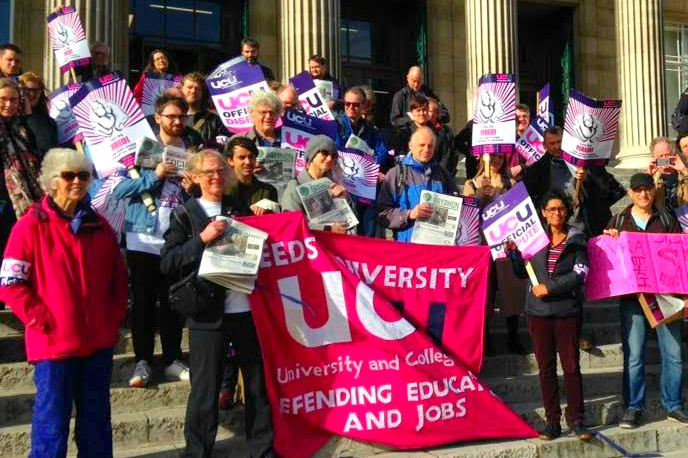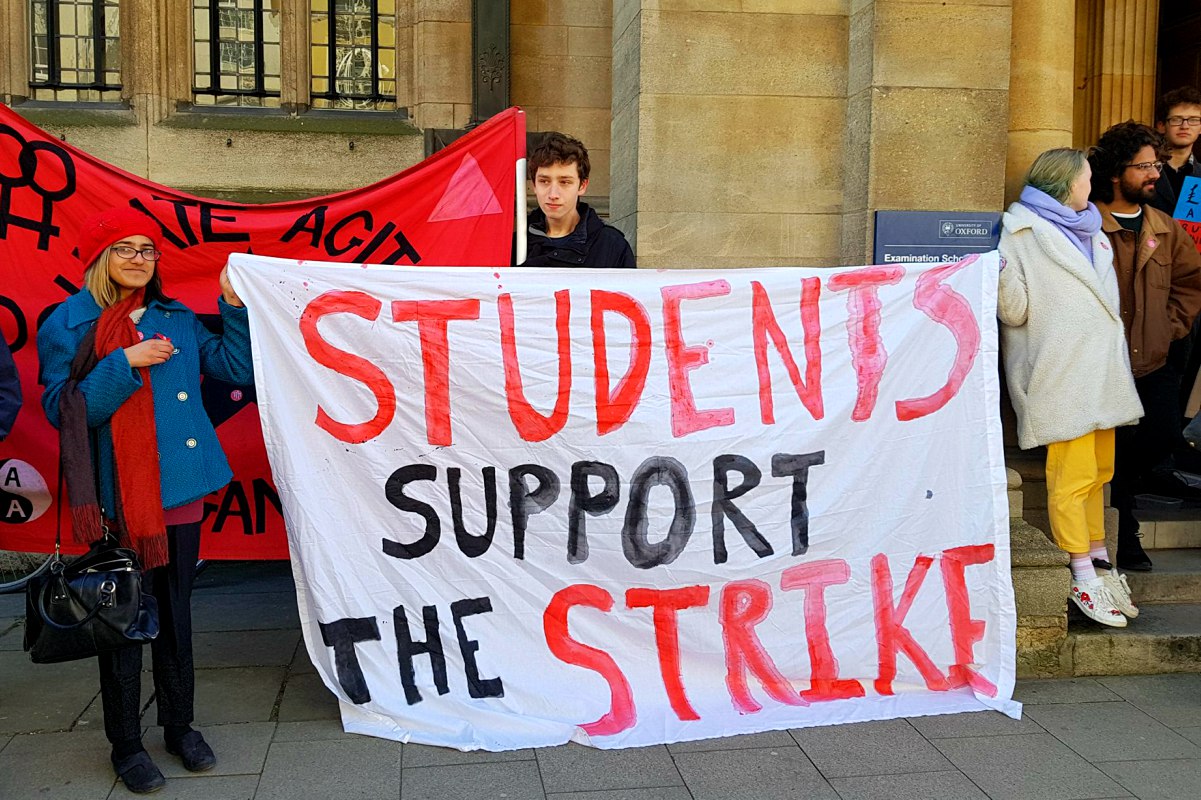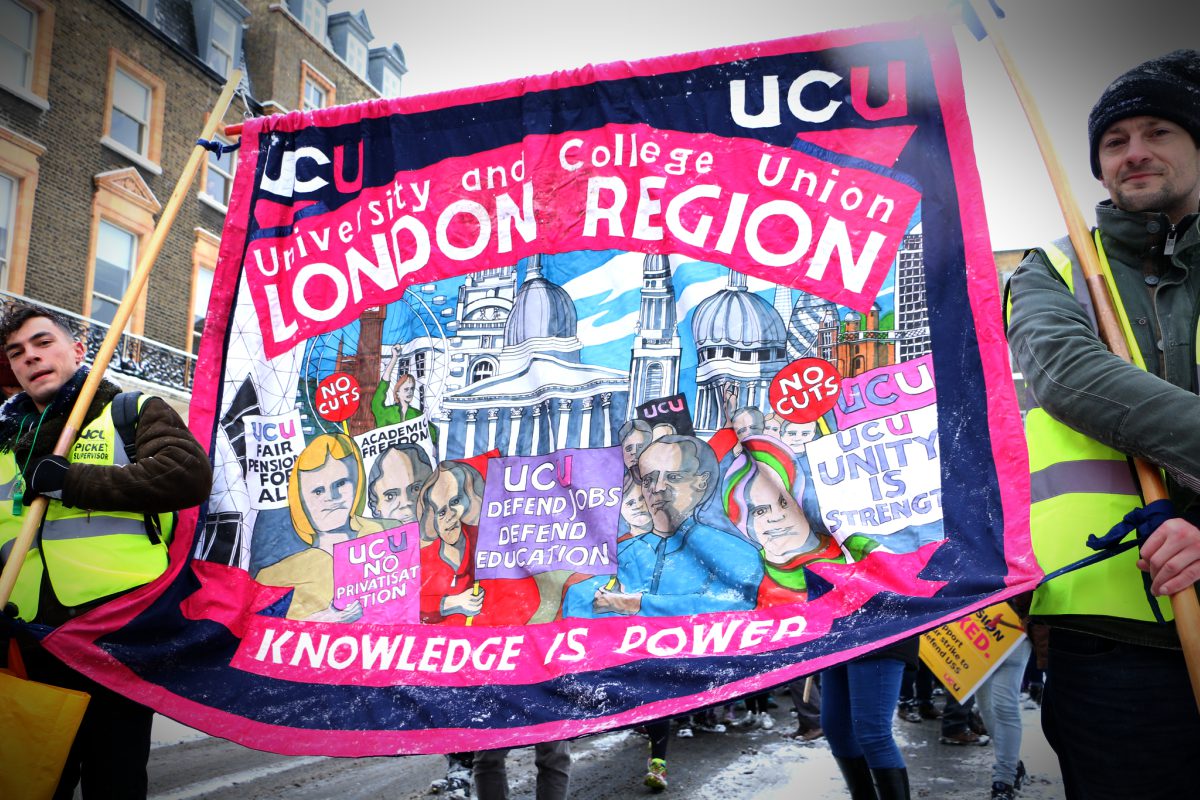Across the country, workers in education are beginning to mobilise against job cuts, attacks on conditions, and management attempts to force an unsafe return to workplaces. The trade unions need to launch a united fightback.
Storm clouds are gathering as attacks on workers in the Universities and Colleges Union (UCU) escalate. The rumbling thunderclaps of class struggle remain isolated and localised for now. But these portend a general period of tumult, tempest, and lightning strikes.
Industrial action looks set to convulse campuses across the country. This is in response to employers’ attempts to force university staff to return to face-to-face teaching. Furthermore, management are seeking to institute a new wave of cuts.
Jo Grady’s support for strike ballots to resist an unsafe, premature return to on-campus teaching is therefore a welcome and necessary step.
What is now needed is to connect local struggles with a coordinated national campaign. This should be focused on giving staff control over any future decisions about face-to-face teaching; resisting escalating attacks (e.g. redundancies); and connecting the UCU’s struggles with the student rent strike campaigns and the NEU’s battle for safe schools.
With public sector workers across the board also facing job cuts, attacks on conditions, and a freeze on pay, unions in the education sector should be organising with a view to the calling of a one-day public sector strike.
Local battles

Numerous UCU branches have either won ballots for strike action, have declared their intention to ballot, or are preparing the ground for such ballots soon.
The first university to win a ballot over the issue of unsafe return to work was Northumbria University in late November. This was followed by similar votes at Birmingham City University and Solent University. UCU branches at Manchester Metropolitan University and Essex University are also balloting members over health and safety concerns.
University managers are arguing that lecturers are key workers who ought to be expected to deliver teaching on campus. This is a thoroughly dishonest reading of the government guideline, and is typical of employers’ flagrant disregard for the wellbeing and safety of staff.
As in the private sector, in the marketised environment of the higher education sector, the health of workers always comes second for the bosses. Their prime concern is to make money through the collection of fees and rents, and by winning a competitive advantage over other institutions.
Parallel to the disputes over health and safety, a series of struggles is opening over cuts to jobs and services in higher education (HE).
Brighton UCU has declared a strike over cuts to IT services, while redundancies are also looming at Roehampton University, the University of Leeds, and Leicester University.
At Leicester, the business school – which is dominated by left-wing academics whose work is critical of management – is particularly affected. At the University of East London, the attacks are again combined with a union-busting effort and the targeting of known left-wingers. Prominent activist and anti-capitalist lecturer Gargi Bhattacharya is among those who have been told that their work is redundant. The UCU branch is preparing to strike.
Struggle across the board
Each of these disputes demonstrates the building anger among workers in higher education. Last year’s strikes failed to produce a decisive victory. Combined with the pressures of the pandemic, this led to moods of demoralisation and fatigue.
But the coming months will continue to add new combustible material. And the first fires of a new militancy are already in evidence.
Nor is the struggle confined to higher education. At Mansfield College, management have cut jobs without adequate notice, and despite guaranteed funding to cover the wages. This follows a long process of cuts and attacks at the college.
Why does UCU need a Marxist caucus? A thread:
We are living through a period of capitalist crisis without precedent. This crisis is global, but in Britain it is a crisis of a special character: particular to a former world hegemon in terminal decline.
— UCU Marxists (@ucumarxists) January 11, 2021
These cuts are compounded by an insulting, below-inflation pay offer – of a 1% increase – to further education (FE) staff nationally. This is on top of a 30% real-terms cut in wages since 2009.
The UCU must coordinate with other unions organising in FE – such as Unite, Unison, NEU, and GMB – to prepare a nationwide united struggle against management’s regime of austerity for workers and largesse for the bosses.
UCU also organises prison educators, who have had to contend with the extremely high rates of COVID infections in UK prisons. Providers such as PeoplePlus and Novus have repeatedly put staff in danger of infection, and have responded coolly to the union’s objections. Once again, bold action is needed to make work safe for staff.
Unite and fight

Looking at the general situation across higher and further education, the urgent need for coordinated and militant action is clear.
UCU Left is correct to call for a national online conference of reps, to emulate the excellent example in NEU. We urge UCU activists to raise motions to this effect at their branches. It is necessary to organise and channel the widespread grievances into a plan for united action.
We must be clear that any return to work should be under the control of staff, through their unions, rather than being determined by irresponsible and careless bosses.
Equally, the best way to prevent redundancies and other attacks is by giving staff control over budgets. Any actual shortfalls in funding should be covered by emergency government funding, sourced from the brimming pockets of the super-rich and the gilded bank accounts of the monopolies.
The UCU Solidarity Movement has rightly called for student-staff assemblies on every campus. Such exceptional bodies would ensure that the links between HE workers and students fighting for rent rebates are not routine and bureaucratic, but are open, democratic, and capable of fostering grassroots militancy.
Pressure must also be applied to the very tops of the labour movement: the TUC and Labour leadership. The crisis in education did not begin with the pandemic; and it will not diminish once the virus is under control. Rather, it flows from the ongoing crisis of capitalism, which continues to deepen, demanding austerity and attacks on workers everywhere.
Workers and students therefore need to launch a coordinated militant fightback – not only of a defensive and industrial character, but with the aim of defeating this wretched Tory government and addressing the crisis with socialist policies.






